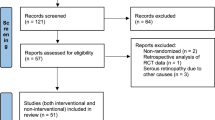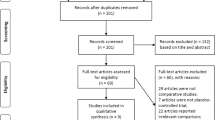Abstract
Background Central serous chorioretinopathy (CSC) is a widespread retinal disorder, and 30–50% of patients eventually result in retinal pigment epithelium atrophy and irreversible vision loss. Aim of the review To evaluate the effectiveness of medications based on anti-vascular endothelial growth factor (anti-VEGF) on central serous chorioretinopathy (CSC). Method A systematic search on anti-VEGF medication treatments for CSC was performed in Pubmed, Embase, and the Cochrane Library prior to May 2016. The main outcome variables were best-corrected visual acuity (BCVA) and central macular thickness (CMT). All effects were analyzed via Review Manager 5.3. Results Fourteen studies were incorporated with a total of 266 eyes, divided into a comparative group and a non-comparative group. The comparative group included acute and chronic CSC studies, while the non-comparative group included chronic CSC only. Meta-analysis revealed that for acute CSC, anti-VEGF treatment was not superior to observation at a 6-month follow-up in BCVA and CMT. For chronic CSC in the comparative group, no significant difference was observed between anti-VEGF treatment and observation in BCVA; however, the observed difference in CMT (WMD = −67.78, 95% CI 20.17–115.38) was statistically significant. In the non-comparative group, significant differences were observed after anti-VEGF treatment in BCVA and CMT at 1, 6, and 12 months follow-ups. Conclusion Our meta-analysis partially indicated that anti-VEGF medications might be a viable choice for the treatment of chronic CSC; however, due to the self-limiting nature of CSC, care should be applied in the clinical application of anti-VEGF medications.




Similar content being viewed by others
References
Gemenetzi M, De Salvo G, Lotery AJ. Central serous chorioretinopathy: an update on pathogenesis and treatment. Eye. 2010;24:1743–56.
Nicholson B, Noble J, Forooghian F, Meyerle C. Central serous chorioretinopathy: update on pathophysiology and treatment. Surv Ophthalmol. 2013;58:103–26.
Liu B, Deng T, Zhang J. Risk factors for central serous chorioretinopathy: a systematic review and Meta-analysis. Retina. 2016;36:9–19.
Yannuzzi LA. Type-A behavior and central serous chorioretinopathy. Retina. 1987;7:111–31.
Negi A, Marmor MF. Experimental serous retinal detachment and focal pigment epithelial damage. Arch Ophthalmol. 1984;102:445–9.
Pitcher JR, Witkin AJ, DeCroos FC, Ho AC. A prospective pilot study of intravitreal aflibercept for the treatment of chronic central serous chorioretinopathy: the Contain study. Br J Ophthalmol. 2015;99:848–52.
Koss MJ, Beger I, Koch FH. Subthreshold diode laser micropulse photocoagulation versus intravitreal injections of bevacizumab in the treatment of central serous chorioretinopathy. Eye. 2012;26:307–14.
Okamoto M, Matsuura T, Ogata N. Choroidal thickness and choroidal blood flow after intravitreal bevacizumab injection in eyes with central serous chorioretinopathy. Ophthalmic Surg Lasers Imaging Retina. 2015;46:25–32.
Fujimoto H, Gomi F, Wakabayashi T, Sawa M, Tsujikawa M, Tano Y. Morphologic changes in acute central serous chorioretinopathy evaluated by fourier-domain optical coherence tomography. Ophthalmology. 2008;115(1494–1500):1500–1.
Imamura Y, Fujiwara T, Margolis R, Spaide RF. Enhanced depth imaging optical coherence tomography of the choroid in central serous chorioretinopathy. Retina. 2009;29:1469–73.
Mitarai K, Gomi F, Tano Y. Three-dimensional optical coherence tomographic findings in central serous chorioretinopathy. Graefes Arch Clin Exp Ophthalmol. 2006;244:1415–20.
Wang M, Munch IC, Hasler PW, Prunte C, Larsen M. Central serous chorioretinopathy. Acta Ophthalmol. 2008;86:126–45.
Prunte C. Indocyanine green angiographic findings in central serous chorioretinopathy. Int Ophthalmol. 1995;19:77–82.
Yang L, Jonas JB, Wei W. Choroidal vessel diameter in central serous chorioretinopathy. Acta Ophthalmol. 2013;91:e358–62.
Tan CS, Cheong KX, Sadda SR. Changes in choroidal thickness after photodynamic therapy in patients with central serous chorioretinopathy. Acta Ophthalmol. 2014;92:e79.
Levine R, Brucker AJ, Robinson F. Long-term follow-up of idiopathic central serous chorioretinopathy by fluorescein angiography. Ophthalmology. 1989;96:854–9.
Wong KH, Lau KP, Chhablani J, Tao Y, Li Q, Wong IY. Central serous chorioretinopathy: what we have learnt so far. Acta Ophthalmol. 2016;94:321–5.
Iacono P, Battaglia PM, Falcomata B, Bandello F. Central serous chorioretinopathy treatments: a mini review. Ophthalmic Res. 2015;55:76–83.
Burumcek E, Mudun A, Karacorlu S, Arslan MO. Laser photocoagulation for persistent central serous retinopathy: results of long-term follow-up. Ophthalmology. 1997;104:616–22.
Robertson DM, Ilstrup D. Direct, indirect, and sham laser photocoagulation in the management of central serous chorioretinopathy. Am J Ophthalmol. 1983;95:457–66.
Ficker L, Vafidis G, While A, Leaver P. Long-term follow-up of a prospective trial of argon laser photocoagulation in the treatment of central serous retinopathy. Br J Ophthalmol. 1988;72:829–34.
Solomon SD, Lindsley K, Vedula SS, Krzystolik MG, Hawkins BS. Anti-vascular endothelial growth factor for neovascular age-related macular degeneration. Cochrane Database Syst Rev. 2014;8:D5139.
Aydin E. The efficacy of intravitreal bevacizumab for acute central serous chorioretinopathy. J Ocul Pharmacol Ther. 2013;29:10–3.
Inoue M, Kadonosono K, Watanabe Y, Kobayashi S, Yamane S, Arakawa A. Results of one-year follow-up examinations after intravitreal bevacizumab administration for chronic central serous chorioretinopathy. Ophthalmologica. 2011;225:37–40.
Lim JW, Kim MU. The efficacy of intravitreal bevacizumab for idiopathic central serous chorioretinopathy. Graefes Arch Clin Exp Ophthalmol. 2011;249:969–74.
Lim JW, Ryu SJ, Shin MC. The effect of intravitreal bevacizumab in patients with acute central serous chorioretinopathy. Korean J Ophthalmol. 2010;24:155–8.
Salehi M, Wenick AS, Law HA, Evans JR, Gehlbach P. Interventions for central serous chorioretinopathy: a network meta-analysis. Cochrane Database Syst Rev. 2015;12:D11841.
Chung YR, Seo EJ, Lew HM, Lee KH. Lack of positive effect of intravitreal bevacizumab in central serous chorioretinopathy: meta-analysis and review. Eye. 2013;27:1339–46.
Artunay O, Yuzbasioglu E, Rasier R, Sengul A, Bahcecioglu H. Intravitreal bevacizumab in treatment of idiopathic persistent central serous chorioretinopathy: a prospective, controlled clinical study. Curr Eye Res. 2010;35:91–8.
Lim SJ, Roh MI, Kwon OW. Intravitreal bevacizumab injection for central serous chorioretinopathy. Retina. 2010;30:100–6.
Entezari M, Ramezani A, Yaseri M. Intravitreal bevacizumab for treatment of refractory central serous choroidoretinopathy. Korean J Ophthalmol. 2012;26:139–42.
Bae SH, Heo JW, Kim C, Kim TW, Lee JY, Song SJ, et al. A randomized pilot study of low-fluence photodynamic therapy versus intravitreal ranibizumab for chronic central serous chorioretinopathy. Am J Ophthalmol. 2011;152:784–92.
Semeraro F, Romano MR, Danzi P, Morescalchi F, Costagliola C. Intravitreal bevacizumab versus low-fluence photodynamic therapy for treatment of chronic central serous chorioretinopathy. Jpn J Ophthalmol. 2012;56:608–12.
Bae SH, Heo J, Kim C, Kim TW, Shin JY, Lee JY, et al. Low-fluence photodynamic therapy versus ranibizumab for chronic central serous chorioretinopathy: one-year results of a randomized trial. Ophthalmology. 2014;121:558–65.
Kim DY, Joe SG, Yang SJ, Lee JY, Kim JG, Yoon YH. The association between choroidal thickness variations and response to intravitreal bevacizumab in central serous chorioretinopathy. Korean J Ophthalmol. 2015;29:160–7.
Unlu C, Erdogan G, Aydogan T, Sezgin AB, Kardes E, Kiray GA, et al. Intravitreal bevacizumab for treatment of central serous chorioretinopathy. J Ophthalmic Vis Res. 2016;11:61–5.
Jamil AZ, Rahman FU, Iqbal K, Ansari HM, Iqbal W, Mirza KA. Intravitreal bevacizumab in central serous chorioretinopathy. J Coll Phys Surg Pak. 2012;22:363–6.
Lee JY, Chae JB, Yang SJ, Kim JG, Yoon YH. Intravitreal bevacizumab versus the conventional protocol of photodynamic therapy for treatment of chronic central serous chorioretinopathy. Acta Ophthalmol. 2011;89:e293–4.
Schaal KB, Hoeh AE, Scheuerle A, Schuett F, Dithmar S. Intravitreal bevacizumab for treatment of chronic central serous chorioretinopathy. Eur J Ophthalmol. 2009;19:613–7.
Unlu C, Erdogan G, Gezginaslan TA, Akcay BI, Kardes E, Bozkurt TK. Subfoveal choroidal thickness changes after intravitreal bevacizumab therapy for central serous chorioretinopathy. Arq Bras Oftalmol. 2016;79:308–11.
Seong HK, Bae JH, Kim ES, Han JR, Nam WH, Kim HK. Intravitreal bevacizumab to treat acute central serous chorioretinopathy: short-term effect. Ophthalmologica. 2009;223:343–7.
Mehany SA, Shawkat AM, Sayed MF, Mourad KM. Role of Avastin in management of central serous chorioretinopathy. Saudi J Ophthalmol. 2010;24:69–75.
Funding
No funding was received for this research.
Author information
Authors and Affiliations
Corresponding author
Ethics declarations
Conflicts of interest
The authors declare no conflict of interest.
Rights and permissions
About this article
Cite this article
Ji, S., Wei, Y., Chen, J. et al. Clinical efficacy of anti-VEGF medications for central serous chorioretinopathy: a meta-analysis. Int J Clin Pharm 39, 514–521 (2017). https://doi.org/10.1007/s11096-017-0460-4
Received:
Accepted:
Published:
Issue Date:
DOI: https://doi.org/10.1007/s11096-017-0460-4




